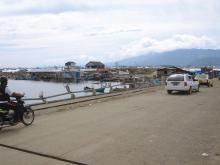Indonesia will form a consortium of state enterprises to build all the 2,700km of the Trans-Sumatra toll highway, from Lampung to Aceh on the island of Sumatra. The finance department is also setting up special infrastructure banks to provide flexible loans for the state departments to fund the project, Indonesian media reported. Indonesia recently changed the law that had the state infrastructure company PT Hutama Karya as the only organisation allowed to build major projects. Other state enterprises can n
RSSIndonesia will form a consortium of state enterprises to build all the 2,700km of the Trans-Sumatra toll highway, from Lampung to Aceh on the island of Sumatra.
The finance department is also setting up special infrastructure banks to provide flexible loans for the state departments to fund the project, Indonesian media reported.
Indonesia recently changed the law that had the state infrastructure company PT5206 Hutama Karya as the only organisation allowed to build major projects. Other state enterprises can now invest in such projects as part of a strategy to accelerate the construction.
However, an economic and financial feasibility study is yet to be completed for the project that could cost as much as US$23 billion, said public works minister Basuki Hadimujono.
A 2k stretch is already under construction and the government hopes a 16km route around the North Sumatra provincial capital Medan will be open next year.
Sumatra is the largest island that is entirely in Indonesia and the sixth largest island in the world at 480,847.74 km2. More than 50 million people live on Sumatra, including 4.3 million living in and around Medan.
The announcements come just after the central government cancelled what would have been one of the country’s largest ever infrastructure projects, the Sunda Strait Bridge.
The 30km bridge that would have connected the islands of Sumatra and Java at a cost of around $23 billion. The structure -- a dream of Indonesia's political elite since the 1960s -- was to have three lanes of traffic in each direction, twin rail tracks and cabling for telecommunications and electricity.
But in November, President Joko Widodo, recently elected at the time, dumped the megaproject, saying it would benefit only middle class Indonesians. Instead, other options, including buying more ferry ships and upgrading shipping freight ports, will be explored to better connect the two islands.
The proposed bridge was part of the Master Plan for the Acceleration and Expansion of Indonesian Economic Development formulated by former president Susilo Bambang Yudhoyono. Howwever, it was left in limbo due to divided opinion among his ministers, especially on how the project should be funded by public and private investors.
The finance department is also setting up special infrastructure banks to provide flexible loans for the state departments to fund the project, Indonesian media reported.
Indonesia recently changed the law that had the state infrastructure company PT
However, an economic and financial feasibility study is yet to be completed for the project that could cost as much as US$23 billion, said public works minister Basuki Hadimujono.
A 2k stretch is already under construction and the government hopes a 16km route around the North Sumatra provincial capital Medan will be open next year.
Sumatra is the largest island that is entirely in Indonesia and the sixth largest island in the world at 480,847.74 km2. More than 50 million people live on Sumatra, including 4.3 million living in and around Medan.
The announcements come just after the central government cancelled what would have been one of the country’s largest ever infrastructure projects, the Sunda Strait Bridge.
The 30km bridge that would have connected the islands of Sumatra and Java at a cost of around $23 billion. The structure -- a dream of Indonesia's political elite since the 1960s -- was to have three lanes of traffic in each direction, twin rail tracks and cabling for telecommunications and electricity.
But in November, President Joko Widodo, recently elected at the time, dumped the megaproject, saying it would benefit only middle class Indonesians. Instead, other options, including buying more ferry ships and upgrading shipping freight ports, will be explored to better connect the two islands.
The proposed bridge was part of the Master Plan for the Acceleration and Expansion of Indonesian Economic Development formulated by former president Susilo Bambang Yudhoyono. Howwever, it was left in limbo due to divided opinion among his ministers, especially on how the project should be funded by public and private investors.





